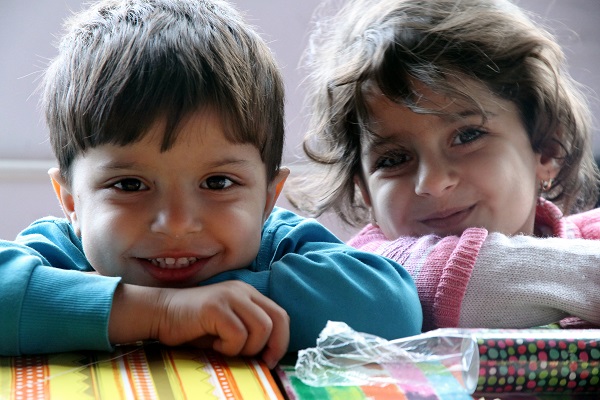 North West Balkans
North West Balkans
Languages
Joint statement of the Children’s Rights Ombudsmen Network in South-East Europe – CRONSEE on the occasion of the 30th anniversary of the Child Rights Convention

Children in a refugee centre in Serbia. Photo by Nikola Vrzić, Save the Children
In November 2019 the world marks the 30th anniversary of the adoption of the Convention on the Rights of the Child (UNCRC), the most widely ratified Human Rights treaty in history. Embodying a compelling idea that children are human beings and individuals with their own rights, the UNCRC has set the overarching principles by which every society should treat every child, and has played a critical role in improving the lives of children over the last 30 years.
The 30th Anniversary of the Convention on the Rights of the Child is an opportunity to assess the status of the rights of children and celebrate the achievements, but also consider measures to strengthen the Convention’s implementation and promote the awareness of child rights.
The countries of South-East Europe, as parties to the Convention, have accepted the minimum standards for children prescribed by the Convention as a foundation of the laws and policies concerning children. The Offices of Ombudspersons in the region have been using the Convention to promote better results for all children and ensure accountability for rights violations. The lives of children in the region today are significantly better than 30 years ago. More children are living in dignified conditions, having access to health care and education. Measures have been put in place to raise awareness of the problem of violence against children and protect children from harm. Efforts have been made to prevent discrimination and provide every child with access to resources and services necessary for their full development.
Nevertheless, many challenges remain for children to tackle poverty, violence, gender inequality, deprivation and discrimination. Most recently, the countries in the region have been under an increased pressure to respond to the needs of refugee, migrant and asylum-seeking children, and, despite the many achievements, child rights are still frequently threatened. The impact on children can be grave, taking away not only from their future, but also from the future of the societies they live in or will be living in. We have an obligation to ensure that no child is left behind.
This anniversary provides an opportunity for state parties to renew their commitment to child rights and outline concrete actions that will be taken to advance children’s rights.
Recalling the commitments made by becoming parties to the Convention, we call on governments in South East Europe to ensure advancement of child rights in line with the national recommendations by the Committee on the Rights of the Child, to improve cooperation with organizations working to protect children’s rights, including national human rights institutions, and invest additional efforts in supporting and protecting all children, particularly vulnerable groups of children, such as children on the move.
South East Europe Children’s Rights Ombudspersons Network (CRONSEE) was established in 2006 by the initiative of the international organization Save the Children, and remained supported in its work by this organization. Composed of 14 national and sub-national Ombudsman Institutions from the region (Albania, Bosnia and Herzegovina, Bulgaria, Croatia, Cyprus, Greece, North Macedonia, Montenegro, Romania, Slovenia, Serbia and Kosovo*), CRONSEE was established as a regional network having in mind that the children in the South East Europe countries face very similar situations and often same violation of rights, aiming to effectively address such issues. The network provides opportunity for Ombudsman Institutions to learn from each other’s experiences, to harmonize their positions on specific child rights topics, to jointly address burning issues and identify mutual priorities, apply the same approach to specific issues. The members of the network meet regularly at thematic meetings and conferences. The conclusions they reach become advocacy initiatives towards institutions responsible for child rights implementation in each of their respective countries and guidelines for joint activities aiming to contribute to the overall improvement of the situation for children in the region.